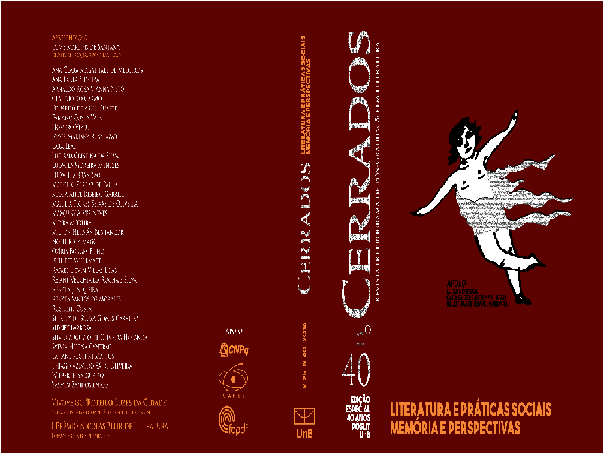From memory to postmemory: political conclusions and contemporary literary fiction
Keywords:
Memory. Postmemory. The end. Contemporary narrative.Abstract
The memory is political. A consensus seated in their own constructional nature. Hence the postmemory whose politicization reaches the climax, in that it seems to be more specific and effective in social joint to achieve a possible aspect of representation, including the literary fiction. In this sense, seated on studies that point to the memory of discussion (CANDAU, 2014) and postmemory (HIRSCH, 2008), we seek a relationship of these memory constructions in contemporary narrative, especially the novel “The End” by Fernanda Torres.
Downloads
References
BERGSON, Henri. Matéria e memória. Trad. Paulo Neves. São Paulo: Martins Fontes, 1999.
BOURDIEU, Pierre. Meditações pascalianas. Trad. Sergio Miceli. Rio de Janeiro: Bertrand Brasil, 2001, p.184.
BRANDÃO, Junito de Souza. Mitologia grega. v. 1. Petrópolis: Vozes, 1986.
CANDAU. Joel. Memória e identidade. São Paulo: Contexto, 2014.
DERRIDA, Jacques. Mal de arquivo ”“ uma impressão freudiana. Trad. Cláudia de Moraes Rego. Rio de Janeiro: Relume Dumará, 2001.
HALBWACHS, Maurice. A memória coletiva. São Paulo: ed. Centauro, 2004.
HIRSCH, Marianne. The generation of postmemory. Poetics today, v.29, n.1, 2008, p.28-103.
POLLACK, Michael. Memória e identidade social. Rio de Janeiro: Estudos Históricos, vol. 5, n. 10, 1992, p. 200-212
TORRES, Fernanda. Fim. São Paulo: Companhia das Letras, 2013.
Downloads
Published
How to Cite
Issue
Section
License
Proibida a reprodução parcial ou integral desta obra, por qualquer meio eletrônico, mecânico, inclusive por processo xerográfico, sem permissão expressa do editor (Lei n. 9.610 de 19/2/1998 )



